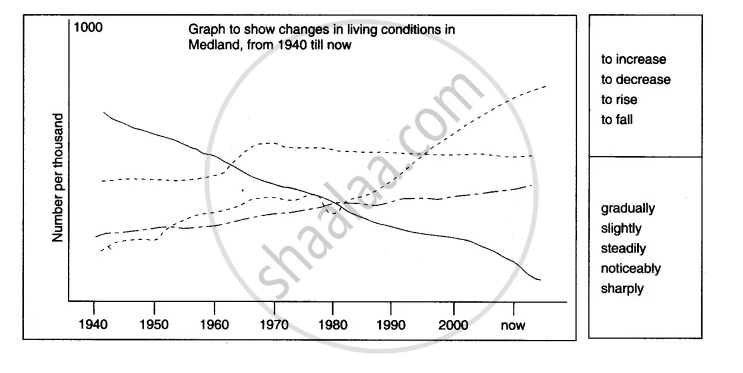Advertisements
Advertisements
प्रश्न
The verb ‘to have’
Be careful with the verb ‘to have’, which has many different uses and meanings. Study the box below and consider the sentences that follow.
| Health (H) | Possession (P) | Relationship (R) | |
| Mr Sinha | headache | Maruti car | two daughters |
Put a tick (✓) or cross (✗) against each sentence according to whether it is correct or incorrect.
- Mr Sinha has a severe headache. ___________
- He is having a blue-coloured Maruti car. ___________
- Mr Sinha has two daughters and no sons. ___________
उत्तर
- Mr Sinha has a severe headache. ✓
- He is having a blue-coloured Maruti car. ✗
- Mr Sinha has two daughters and no sons. ✓
APPEARS IN
संबंधित प्रश्न
Answer the following question briefly:
What does the dark, sun-dried appearance of the Sergeant suggest about him?
Answer the following question briefly:
How was Private Quelch’s knowledge exposed even further as the Sergeant’s classes went on?
Many people are of the opinion that violent, physical sports such as boxing, kick boxing and wrestling, to name a few should be banned while others think otherwise. Express your opinion on the topic by either writing in favour of banning these sports or against banning them. While writing, you should also include the rebuttal to your questions. Try not to go beyond 200 words.
Answer the following question briefly.
Describe the two roads that the poet comes across.
Answer the following question.
Give an appropriate proverb that conveys the message that this poem carries.
Now write three situations similar to (a) in the box. Exchange the information with your partner and guess the answer to each other's situations as in (b).
Question 1.
My dog is barking angrily and is trying to get loose.
Question 2.
The car is making a curious noise.
Question 3.
Satish enters breathing heavily.
Satish enters breathing heavily.
(4)

Choose a suitable word from the options given and complete the story from Tunisia.
A weary traveller stopped at a Bedouin’s tent and asked for shelter for the night. Without (a)_______ delay, the man killed (b) _______chicken and handed it to (c)_______ wife for (d)___________ guest’s supper. As the woman stirred the meat in (e) _______ copper cooking pot, she smelled the rich steam and could not resist tasting (f)________ of the meat and soup, to see if it was soft and tasty. But mouthful followed mouthful, and there wasn’t (g)__________chicken left but for the neck piece, which she gave to her little son to nibble. The boy found it so tasty that he whined, “Give me (h)_______ more chicken, mother!” The woman slapped the little boy and scolded him: “It’s a shameful habit (i)______ father taught you, enough of it, I tell you!” On the (j) _______ side of the wooden hanging which screened the woman’s part of the tent from the rest, the traveller overheard them. “What habit has (k)______ father taught (l) _______ child?” he asked curiously. “Oh,” said the woman, “whenever a guest arrives at (m)_______ tent, he cuts off his ears and roasts them over the fire for (n)______ son to eat.” Making not a sound, the traveller picked up (o)_______ shoes and ran.
| (a) (i) no any (ii) little (iii) any (iv) no |
| (b) (i) a few (ii) some (iii) few (iv) a |
| (c) (i) his (ii) her (iii) their (iv) there |
| (d) (i) the (ii) a (iii) theirs (iv) their |
| (e) (i) her (ii) hers (iii) the (iv) an |
| (f) (i) some (ii) few (iii) a few (iv) more |
| (g) (i) any (ii) some (iii) a few (iv) few |
| (h) (i) little (ii) a little (iii) a few (iv) some |
| (i) (i) hers (ii) yours (iii) their (iv) his |
| (j) (i) another (ii) another (iii) other (iv) one |
| (k) (i) hers (ii) her (iii) him (iv) his |
| (l) (i) a (ii) an (iii) the (iv) x |
| (m) (i) x (ii) our (iii) ours (iv) their |
| (n) (i) their (ii) his (iii) him (iv) our |
| (o) (i) her (ii) his (iii) our (iv) x |
Before you listen for the second time, discuss the following with your partner.
- Why are there two presenters?
- What is the presenter’s role?
- What is the presenter’s style? Do you like their style? Why / Why not?
- Why do the presenters outline some of the contents right at the start of the programme?
Write the contracted forms. Practise saying these words.
e.g. ought not to – oughtn’t to.
- cannot _______
- need not _______
- should not _______
- must not _______
- do not _______
- did not _______
As children of the world, you have a role in helping to solve the problems prevalent in society. In groups or four, prepare a short skit on any one problem and present it in front of the class.
